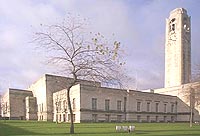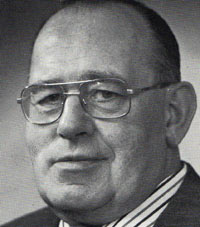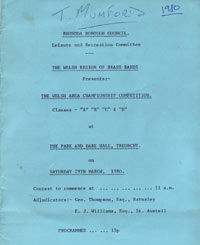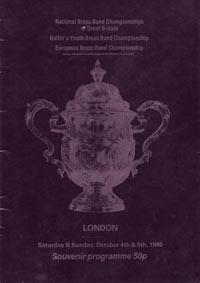4BR Time Team - The curious case of the contest that never was?
12-Feb-201030 years ago a very curious contest took place in Wales. It is a tale of intrigue, duplicity, shabby politics and even shabbier people. And at its centre there was a crook called Robert D. Alexander.
Although Wales is a land of legends, fables and occasional tall stories, 30 years ago this March something happened that was almost – or so very nearly almost - a story that would have made it into the pages of the Mabinogion book of fantastic folklore itself.
It is the tale of the competition that never was: The 1980 Welsh Regional Contest.
If you take glance at the list of prizewinners at the back of an old copy of the Welsh Regional Championship programme, there in black and white is written a most curious entry.
1980: No contest
 The truth of the matter
The truth of the matter
No contest? Yep. No contest. Although that is not quite the whole truth of the matter.
Therein lies a story of duplicity and intrigue, false promises and rumours of double-dealings in smoke filled rooms. It is a story of shabby politics and even shabbier people.
It is a story of when Welsh banding stood up for its right to be independent and strong, and ended up compliant, weak willed and ultimately beaten.
And as with anything to do with the Welsh – it came down to the interference of an English ruler.
At the end of the 1970’s, Welsh banding was in pretty good shape. Numbers at the Welsh Area Contest, held in Swansea (right), were healthy (although bands from the north of the Principality still competed at Blackpool) and in the early part of 1980 the bands were set to compete against each other in the popular Radio Wales contest.
Stalinist control
Welsh banding for all practicable purposes, was run from the front room of a terraced house in the Rhondda Valley. There, a short, lugubrious man with a warm smile and cold eyes called Hayden Evans exerted Stalinist control over the banding world west of Offa’s Dyke.
Evans literally held the life and death of bandsmen in his hands.
Dead men
An apocryphal tale concerned a callow 14 year old boy who was driven by his father to the Welsh Regional Secretary’s home in the middle of night to be told under what seemed the penalty of death, that he could play at a forthcoming contest on what Evans euphemistically called, ‘a dead man’s card’.
The trouble was - there was a dead man involved.
To get around the registration rules, the young player in question was to become a 67 year old ex bass playing miner who had propitiously shed his mortal coil and joined the choir invisible a few days before.
The future 4BR Editor played at the contest as a yet unburied corpse.
The card was destroyed as soon as it was handed to ‘Beria’ Evans (as he was known in certain circles thereafter) at the side of the stage, and no one knew the wiser (until now that is)
 Politburo
Politburo
Evans was helped in no small part by a ‘Politburo’ of 16 people who made up the Welsh Regional Committee. Elected on mass they were trusted to look after Welsh interests, especially against a man who was soon making a nuisance of himself from across the River Severn – one Robert D. Alexander.
Alexander (right) was a crook (also described as ‘an impresario and entrepreneur with extensive business interests’).
No beating about the bush about it. He was as bent as the proverbial butcher’s hook and was also the owner of the National Championships (which when he jumped ship, were left with more unpaid debts than Greece).
And in late 1979 and early 1980 he started to meddle in the affairs of Welsh banding.
Grading
Ostensibly the squabble was over grading.
In reality it was all to do with Welsh independence – a touchy old subject in the Principality, where the slogan ‘Come home to real fire – Buy a holiday home in Wales’, was a bit too close to the truth at times.
Like all small peoples, the Welsh didn’t exactly welcome being told what it could and couldn’t do – especially from a man who oozed such insincerity even his sweat ran crooked.
Banding in South Wales had worked perfectly well for years. Six contests a year decided who would become ‘National’ Champion, and the grading for each band for the following season.
It was a system that ensured participation at exotic venues such as Upper Cwmtwrch and Brynaman, and which, with an almost corruption free transparency of ‘points accumulated’ democracy, led to Wales sending a band to compete at the European contest.
Coffin lid smile
It seemed to the Welsh that Alexander wanted in, and, more importantly, wanted to gain control.
A thick set man with a coffin lid smile who looked like a cross between a Hollywood B movie heavy and Robert Maxwell, his actions started to stir deep waters, and soon unleashed a whirlpool of Welsh fervour not seen since the 1904 Methodist revival.
The Editor of British Bandsman called it: ‘… a sad state of affairs…due to the failure of the National Championships and its Welsh Regional Committee to agree on grading.’
Alexander expected Wales to fall into line with England (Scotland was still independent in banding terms – and that was one fight the old rascal wasn’t going to take on quite yet) and use the same grading system based on the results at the Area contest each year.
Wales wanted nothing of the sort.
Battle lines drawn
Battle lines were drawn, and amid much debate (there were more emergency committee meetings held than you could shake a stick at) an increasingly spiteful war of words bubbled up to such an extent not even the arbitration service ACAS could hope to settle it.
One possible answer lay in allowing Wales to become as independent as Scotland (as mooted by the British Bandsman Editor in this 22nd March 1980 editorial), but Alexander, his substantial hooter now out of joint, was in no mood for giving way.
He dug his heels in and so did the Welsh. There would be no contest and no Welsh band would make the trip up the M4 to compete at either the Royal Albert Hall or any of the lower section contests.
That’s what everyone thought.
 Paul Ringer
Paul Ringer
A week later on the 29th March 1980, at the Parc & Dare Hall in Treorchy, and with passions and anti English feelings still running high (Wales had just lost to England at Twickenham in a match remembered for the sending off of the Welsh forward Paul Ringer – ‘for brushing some mascara out of the eye of the English outside half’, as Max Boyce so eloquently put it), ‘The Welsh Region of Brass Bands’ held its contest.
The Welsh Committee thought they had poked Robert Alexander in the eye by insisting that the bands at ‘The Welsh Area Championship Competition’ play exactly the same test pieces as would have been played if they had all been in Swansea.
Not a single mention was made in the programme (right) about the Nationals - only sincere thanks from Chairman Don Hendy to all the bands who were showing comradely solidarity to the cause by attending the contest.
George Thompson and Eddie Williams were the judges and Cory took the top section title and the £100 top prize in the Championship Section, with Mid Rhondda, Penclawdd and South Glamorgan took the lower section honours. It was like the horse Esha Ness winning the 1993 Grand National.
Crafty sod
Robert D. Alexander was a crafty old sod though.
A week before the contest, British Bandsman had, what many Welsh band supporters thought, was a two page ‘olive branch’ feature to try and encourage new dialogue between the factions, on Cory Band (as reigning Pontins Champion they were to defend their title at Brean Sands on the Easter Monday), whilst at the conclusion of the contest a greetings telegram from the National Brass Band Championships was read out.
Amid ironic cheers, the Welsh thought they had him beat: Alexander had blinked first.
How wrong they were.
The seeds had been sown. Robert D. Alexander had not just poked Welsh banding in the eye, but had blinded them by their own hubris.
 Divide and conquer
Divide and conquer
As British Bandsman reported the results from Treorchy in their 5th April edition, tucked away on the front page just a column to the right under the heading, ‘Invited to London’, was his coup de grace.
’Robert Alexander has advised The British Bandsman that no contest in Wales would be recognised as a qualifying heat for the National Championships, unless run under the jurisdiction of the National. However, under the terms of Rule 44, Cory, Cwmbran, Penclawdd and Celynen Colliery, the 1979 sectional champions, will be invited to the 1980 finals.’
Divide and conquer.
With Alexander dealing directly with the bands in question, Welsh banding’s solidarity to the cause was terminally fractured.
Cory took up their invite (amid rumours of hotel bills and appearance fees being paid) to compete at the Royal Albert Hall and the European contest on the same weekend that October (right).
Celynen took part in the 4th Section (amid tales of a special bus being put on for the band free of charge), but Penclawdd and Cwmbran held firm and sent him packing with a flea in his ear.
Strike breaker
The English ruler may not have secured the victory he wanted, but he had set the wheels in motion that ultimately saw Wales fall meekly into line.
Cory’s reputation in particular took some considerable time to recover, despite becoming European Champion.
‘Strike breaking’ is not a sin easily forgiven in South Wales.
For Welsh banding though, the memory of a peculiar episode remains dimmed but not forgotten.
And it won’t be as long as the single line in the Welsh Regional Championship programme states – 1980: No Contest.
Iwan Fox















